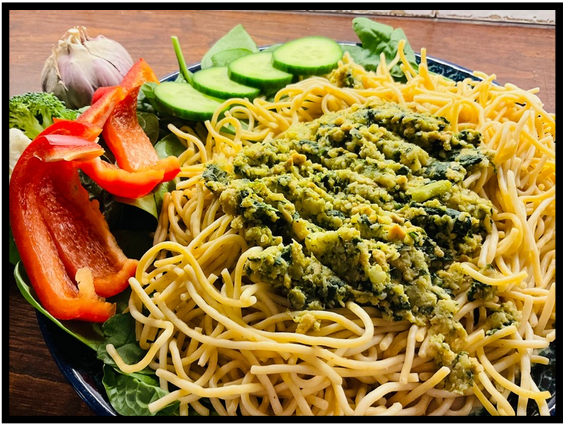
Dietary Curiosity
Whole grain pasta is a powerhouse of nutrition, rich in several key vitamins and minerals, including B vitamins, which are crucial for energy production and brain health. Unlike its refined counterparts, whole grain pasta retains all parts of the grain kernel, providing a healthy dose of fiber that helps in digestion and can aid in maintaining a healthy weight. It also has a lower glycemic index, meaning it causes a slower rise in blood sugar levels, making it a great choice for those managing diabetes. Studies have shown that regular consumption of whole grains, like whole grain pasta, is associated with a lower risk of heart disease and certain types of cancer. Plus, its robust texture and nutty flavor make it a satisfying base for a variety of dishes, from traditional Italian to innovative contemporary recipes.
Ingredients
Recipe
Stuffing
- Mix soy sauce, sesame seeds and grated ginger root in a glass (you can also use grated ginger spice instead of the root).
- Cut the fish into small pieces and mix with the prepared soy sauce. Set the fish aside to marinate in the soy sauce.
- Cut broccoli, cauliflower and garlic into smaller pieces. Place the vegetables in boiling water and cook them for 15-20 minutes until they are soft.
- Heat the olive oil in a pan. Add the fish marinated in soy sauce to the heated olive oil.
- Once the fish is fried, add the cooked and drained vegetables. Fry everything together (if there is too much water, pour it off while frying).
- Finally, add spinach to the stuffing and fry everything together until the spinach leaves shrink (you can also use frozen spinach).
The whole dish
- Boil whole grain Asian noodles in hot water. Cook the pasta for 8-10 minutes.
- Place fresh spinach on a plate, top the spinach with noodles and the prepared Asian fish stuffing.
Tips
- Prepare 3 portions of the dish for 3 days, pack the takeaway meals and you have a delicious dinner ready for half a week at work!
- When choosing fish, pay attention to whether the fish is marked with the MSC (Marine Stewardship Council) certificate. MSC-certified fish come from fisheries that are not over-exploited, which means that the fish have appropriate conditions for growth and development, which may translate into better meat quality. This certificate is global and can be found in many places around the world. You can read more about the MSC certificate on the official website: msc.org
Nutrition Values
400 kcal
Carbs: 35 g, Protein: 26 g, Fats: 13 g











